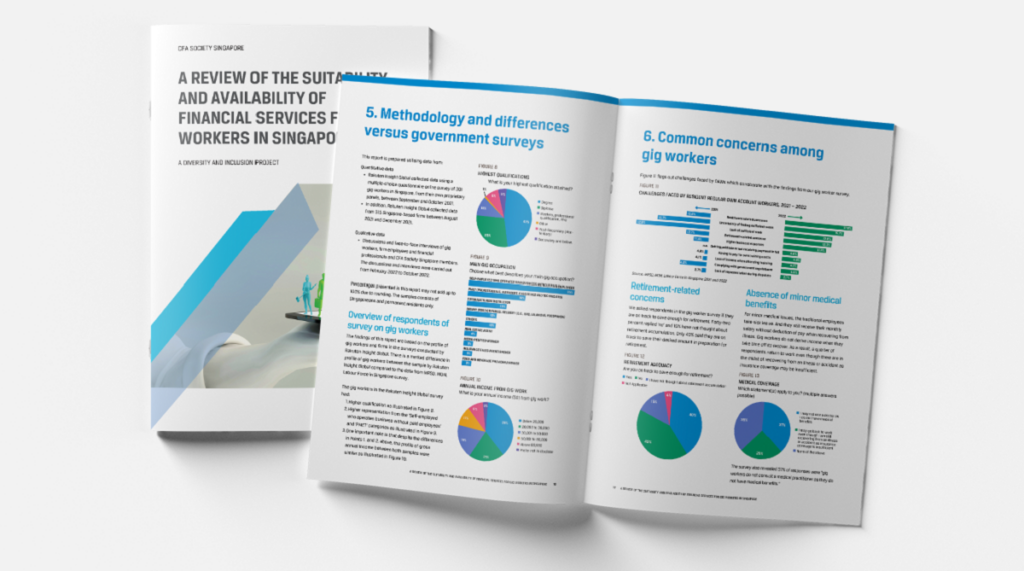Suitable financial services can help gig workers achieve aspirations
Originally posted on CFA Society Singapore on May 29th, 2023
When we put on an inclusion lens and look through them, the Singapore landscape throws up groups of people that the financial sector often underserves. One group caught our eye — gig workers.
We believe much can be learnt from research done in this area to improve the offerings of financial products to gig workers. CFA Society Singapore believes that with the right and appropriate financial products, variable income workers will have a higher probability of achieving their aspirations and desired retirement sum.
Gaps & challenges faced by giggers that firms can fill
In the CFA Society Singapore survey and interviews conducted in 2021 and 2022, a few findings stood out:
- ○ Giggers are a heterogenous group with markedly different age, education, income, skills, and work profiles. A granular understanding of these profiles will enable firms to adopt a more targeted and profitable suite of products.
- ○ Giggers did not have high awareness and satisfaction of existing financial products and services as they struggled to name dedicated financial products designed for them.
- ○ Giggers faced challenges to investing as: (a) they need to allocate “resources” to gig work; (b) they face a hurdle in meeting the minimum investment threshold required by financial institutions; (c) they feel the need to hold on to cash due to the fluctuating nature of income from gig work; and (d) they feel the quantum of returns in absolute dollars is not compelling, as a 4.0% per annum return on $1,000 is only $40 over a 12-month period, or less than $4 a month.
- ○ Giggers did not rely on financial institutions for funding requirements but instead drew on their savings to fund training programmes, equipment investment, and pre-project funding. For these three areas, only 3%, 6%, and 9%, respectively, of giggers relied on loans from financial institutions.
- ○ Giggers did not aggressively seek out medical and insurance products as seeking medical attention took time from gig work and current products did not suit their needs.

Suggestions and recommendations
- 1. Recognition of gig workers
We recognise that they may be certain biasness against and stigma attached to gig workers as a category of workers. Even the very term gig workers may not sit well with certain individuals who may associate these workers with a carefree irresponsible image.
There are exceedingly successful gig workers in every field. If income were to be used as a criterion to measure success, we will be able to find some gig workers in the top decile. Hence an important starting point that is often overlooked is to recognise gig workers, and their need for suitable and appropriate financial products and services.
- 2. Categorisation of giggers
Not only is the job nature of gig workers changing, but they also are not homogenous either. Categorisation of giggers will give rise to a better understanding of the nature of their work, career path and spectrum of income patterns.
Asking the right questions can greatly aid in how to categorise the gig workers for the financial institutions’ specific purpose. Interviewees fed back that many a time they did not know how to proceed when application questions touched on:
- ○ Classification or type of profession
- ○ Monthly income
There should be a categorisation that is broad yet granular enough to capture the nature of the work, including income patterns and breaks in income either in a calendar year or between years. Some giggers specialize. Some hold down more than one job. Some take several breaks during the year. Others may take some time off after a few years.
- 3. Borrow practices from restauranteurs to raise awareness of suitable features in financial products
When patrons with special dietary requirements frequent restaurants, some menus leverage on icons or symbols to indicate which items on the ala carte menu are suitable for, say, vegetarians, vegans and others. This is an effective and low-cost way of communicating suitable and appropriate dishes for a select group of customers.
The same practice can be used for features that may be suitable and appropriate for giggers. This will draw the attention of the self-employed to explore these features embedded in financial products and services.
- 4. One-stop centre for giggers
We also wish to highlight some support for a one-stop centre for gig workers. In interviews and discussions with giggers, some giggers voiced support for a central location for them to obtain various information, legal advice and market opportunities (domestic and perhaps international), amongst others.
We believe the one-stop centre can also present an opportunity for financial institutions to raise awareness of the availability of financial products and services as well as market their products and features meant for gig workers.
Methodology
Quantitative data
Rakuten Insight Global collected data using a multiple-choice questionnaire online survey of 301 gig workers in Singapore, from their own proprietary panels, between September and October 2021.
In addition, Rakuten Insight Global collected data from 315 Singapore-based firms between August 2021 and December 2021
Qualitative data
Discussions and face-to-face interviews of gig workers, firm employees and financial professionals and CFA Society Singapore members. The discussions and interviews were carried out from February 2022 to October 2022.
Related articles: The rising cost of living in Asia & the US, Watch Chat Read Shop 2023
For more infographics, updates and our original survey reports, follow us on LinkedIn or subscribe to our newsletter at the bottom of the page.